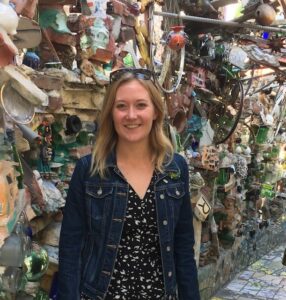
This post was written by current student Delaney King.
———————————————————————————————

When the spring semester began, I started applying for a wide array of Professional Work Experience opportunities, including several suggested by the UNC MPA program. The program has a relationship with the Recycling and Materials Management Section (RMMS) at the Department of Environmental Quality (DEQ) and helped me apply for a position directly with the section. Although I did not know specifically what RMMS does, I was interested in working on environmental projects for DEQ. I tried to learn as much as I could about RMMS before my interview, but in the end, the most valuable resource was the staff themselves. I asked several questions about the job and work environment to the point where I felt like I was the one interviewing staff. Luckily, they were incredibly open, patient, and kind. In fact, a UNC MPA alumna who graduated two years before helped interview me and explained how I could use my MPA coursework in the position and offered me advice about my final year in the program. A few weeks later, I found out that I received a summer internship along with one of my classmates, Elise Traywick.
During the interview I learned I would help RMMS establish a food waste reduction program, and hearing that, I knew I would love this internship! Growing up in California, these topics were always a part of my life. My family started composting before I was born, and I was fortunate to go through a school system with access to a garden program and ecoliteracy classes. I immediately knew the internship was an amazing opportunity to create something from scratch and have a long-term impact on an issue I’m already interested in!
The primary focus of my internship is to assist the new and wonderful Organics Recycling Specialist create resources for DEQ’s Use the Food NC initiative including informational documents, a social media toolkit, and website. We are also planning a stakeholder meeting for the fall to launch the campaign and receive feedback from passionate stakeholders about how DEQ can best help them reduce food waste. Simultaneously, I am visiting recycling sites across the state with staff to learn more about the field and maintain relationships with businesses, local governments, and non-profit organizations. If that isn’t enough, I am also providing additional support to staff on a variety of projects, like the Recycling Markets Directory, and taking over projects like the annual recycling program survey for colleges and universities. I love to stay busy!
This post was written by current MPA student Delaney King.
——————————————————————————————–
My name is Delaney King, and I am currently an MPA student an UNC Chapel Hill. Before enrolling in the MPA program, I graduated from Bryn Mawr College in 2020 with a major in Political Science, concentrating in American Politics and Environmental Policy, and a minor in History.
Work experiences in high school and college, like assisting my congressman with veteran and military casework, taught me well-intentioned policies often fail those they are meant to help because of red-tape, inefficient organizations, poor intergovernmental relations, etc. I began to realize that this was less an issue of the policies and more an issue of administration. This realization was underscored, bolded, italicized, and typed in ALL CAPS as I witnessed the disastrous effects poor administration can have on an entire country during the COVID-19 pandemic. My undergraduate studies primarily focused on public policy development and less about how to administer policy or how to avoid poor administration. Then, I graduated during the first stages of the pandemic, and suddenly, I had more questions but no longer a venue to ask them.
When deciding what I wanted to do next, I reflected that I enjoy learning about and working in policy development, but my work could be more impactful by insuring well thought out policies are equally well-implemented. *Cue the MPA program*
I recently completed my first year, and I am confident I already have a far better idea of how organizations can ensure efficient, effective, and equitable service delivery. I am excited to continue learning more next year, but in the meantime, I am gaining real world experience and applying what I learned during my Professional Work Experience (PWE). This summer I am working as a Research and Program Assistant for the Recycling and Materials Management Section at the NC Department of Environmental Quality (DEQ). Specifically, I am helping create materials and organize a stakeholder meeting to expand DEQ’s food waste reduction efforts. I am beyond excited to work within my field of interest –environmental policy–, learn from individuals with years of experience, and speak with people and institutions who have the capacity to help make a difference.
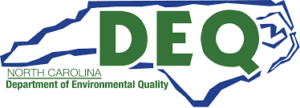
This post was written by current #uncmpa student Stephen Thompson.
———————————————————————————————–
Currently, there is a bill in the Florida state senate which has been called the “Parental Rights in Education” bill. Alternatively, it has been called the “Don’t Say Gay” bill. Officially, it is unnamed: you can read it here. This bill features a few different friction spots which folks are arguing over, however the big point of continuation lies between lines 75 and 78 which read, “A school district may not encourage classroom discussion about sexual orientation or gender identity in primary grade levels or in a manner that is not age-appropriate or developmentally appropriate for students,” [This is where they’re getting the “don’t say gay” tagline]. As an MPA student, this bill caught my attention not entirely for the topic, but rather the text, [sub and metatext!]
There’s a lot of strong feelings on either side of this bill—you can find blogs, news articles, and “talking heads” from here to Tallahassee using ethos, pathos, logos, and any other rhetorical tool Aristotle could philosophize, to argue yay or nay, but this bill cuts to the core of public administration in a fundamental way. Yes, because it regulates the conduct of government employees [local government!], and yes because it resonates with free-speech-ers, but also because it calls for a public discussion of the competing values of public administration. These four values which pull in opposite directions on a X-Y Axis form the four quadrants of public issues: Liberty, Community, Prosperity, and Equality.
 Breaking this down we can see how this question of “what can and what can’t teachers tell children?” lands in all four areas. Liberty; Everyone should be able to say whatever they want, using their own personal discretion as to what is and isn’t appropriate for the situation. Community; but maybe what doesn’t offend me, is downright vulgar to you, so maybe let’s agree on some basic standards. Prosperity; in order for children to succeed they need the best education for them, which may include parents and guardians teaching some topics in more intimate environments. Equality; on the other hand, maybe we should lay some basic groundwork down to ensure everyone knows at least the bare minimum on commonly discussed topics. [Wow, that was a head jerker].
Breaking this down we can see how this question of “what can and what can’t teachers tell children?” lands in all four areas. Liberty; Everyone should be able to say whatever they want, using their own personal discretion as to what is and isn’t appropriate for the situation. Community; but maybe what doesn’t offend me, is downright vulgar to you, so maybe let’s agree on some basic standards. Prosperity; in order for children to succeed they need the best education for them, which may include parents and guardians teaching some topics in more intimate environments. Equality; on the other hand, maybe we should lay some basic groundwork down to ensure everyone knows at least the bare minimum on commonly discussed topics. [Wow, that was a head jerker].
Returning to the document in question [of which there are many questions], we can certainly see how some folks may feel the topic of gender and sexuality are mature concepts, better left to be discussed when a child is older. Conversely, some folks feel that gender is so closely intwined with identity that it should be discussed when children are first forming their own identities and imitating role models in their lives. All of that is well and good, but there’s another piece to this debate that seems to underlie the heated discussion. “…may not encourage classroom discussion… in primary grade levels, or in a manner that is not “age-appropriate…” For me this digs deeper to another fundamental concept of public administration: policy making vs. policy administrating.
Dusting off the age-old argument of “letter of the law” vs. “spirit of the law,” the more consequential question is, “who is interpreting the law?” Public administrators have an awful lot of discretionary power when interpreting policy. One person may interpret “encouraging discussion” as answering a student’s question—one as innocuous as “What does the rainbow flag on bumper stickers mean?” This may lead lawsuit-weary school officials to enact classroom policies which prevent teachers from using terms which acknowledge the concept of homosexuality [don’t say “gay!”]. Other school officials may decide that teachers are permitted to discuss “queer” or “non-binary” identities with students in 5th grade (considered a primary grade in Florida), even though this may differ from some parent’s interpretations of “age-appropriate.” Many times, policy makers enact laws which are vaguely worded specifically because they allow room for multiple interpretations [shoutout to PUBA 710: Institutions and Values], however the stakes become cataclysmically high when violating these laws could result in personal repercussions for individual government employees. Many administrators will opt for an overly restrictive interpretation, rather than expose their staff and organization to lawsuit, every time.
So, here in lies the question: If laws are vaguely worded to allow individual communities the flexibility to determine their own values regarding the finer points of the human experience, should those laws dictate the punishment for violating those statures? Building in civil redress certainly raising the stakes to the point that many profession poker plays would recommend folding; adding the topic to the list of banned discourse and moving on with the lesson plan. –And that is where lawmakers do their constituents a disservice. Allow administrators to set the parameters of policy and define the consequences, or explicitly layout out the penalties associated with a clearly defined policy. One without the other is the illusion of choice with a supersized side of subtext.
I personally hope this bill is voted down, regardless of politics, because it sets a poor precedent for future bills which erode the values of local government and community democracy. Public administrators have a hard row to hoe, whether they’re in the “sunshine state” or the “show me state,” but it’s these dedicated public servants which shape the daily lives and values of our communities. Shakespeare famously wrote, “To be or not to be.” Law makers should take a page out of his book [Hamlet, to be exact], because concise clear language tells the reader exactly where they stand and knowing where you stand makes it a whole lot easier to see where you’re going.
A couple of weeks ago, we had 22 bright and eager students begin our online MPA program, and we couldn’t be more excited to introduce them to you. With most of them averaging 10 years or more of work experience and 27% of them holding advanced degrees, we are proud to be the next step in their personal and professional journeys.
As always, we like to showcase the breadth and diversity of our cohort in terms of backgrounds, interest areas, diversity, and interests. Here are a few of their noteworthy mentions:
1 international student joining us all the way from Jakarta, India
1 Superior Court Judge from California
1 Police Lieutenant from the City of Portland, OR
4 practicing attorneys
4 health care administrators (UNC Health Care and University of Pittsburgh Medical Center, Indian Health Service, and United Network for Organ Sharing)
1 Local Government Employee Match Scholarship Recipient
5 currently working for the federal governemnt
2 Active Military
1 Marine Biology Educator
Obviously, this list is not exhaustive. We are so excited to have all 22 of you, and we promise you’re going to gain so much from this program.
Applying to grad school is a big decision in and of itself, but doing so in the midst of a pandemic and the state of our world brings a whole new level of commitment. While some might find themselves with more time to research graduate school and apply, I suspect many of us are still having a hard time focusing on a big thing amidst all of the chaos and uncertainty.
One thing is for certain, never has there been a more critical time for good public administrators and for people to believe in the power of good public administration. Over the last year, we have seen this at the state and federal levels of government with respect to the pandemic and a public health crisis and economic shutdown. And we have seen it at the local level of government with the focus on fair and equitable law enforcement and public safety issues.
So, we are thankful for all the public administrators out there doing their job well. And we are thankful to our newest MPA students for their drive, tenacity, and interest in making better communities! Good luck and welcome to the Carolina family!
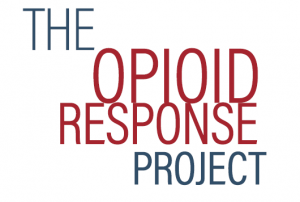
On Day 1, the public forum, things went forward nearly seamlessly in our virtual environment. SOG faculty and staff presented on collective impact, summarized two-year project, and facilitated excellent break-out sessions with team members who had expertise on topics like transportation, housing, and employment and recovery courts. There were some hiccups with the keynote speaker, Sam Quinones, the author of the highly acclaimed book Dreamland. As a journalist, he had a specific perspective of the opioid crisis, which did not always mesh with the experience and expertise of these community teams. For example, he spent over five minutes talking about how the word “addict” should be used to describe people who use drugs or who have Substance Use Disorder (SUD), despite the fact that community members in the chat attested that it was stigmatizing language. Despite these issues, the first day was a great spotlight of the project as a whole.
The second day of the forum was a teams-only event, summarizing the results of their efforts in 5-minute presentations, as well as workshops to focus on their sustainability and further work moving forward. Although there were some minor technical problems with showing some of the first presentations, these were ironed out as the day went on. Teams praised each other’s accomplishments and videos, which allowed them to make even more connections among communities using similar strategies. The teams were also able to use breakout rooms to discuss public values, collective impact, sustainability, and more, and then debrief with SOG faculty as facilitators. It was not the ending that partners may have wanted; their work, and the forum itself, were greatly complicated by the COVID-19 pandemic. However, it seemed like a fitting celebration of the teams themselves, one of the ways that ncIMPACT is managing the end of such a momentous and publicly-involved project.
As my PWE enters its final few weeks, I have been working on finishing several long-term projects, including the presentations for the Opioid Response Project that I spoke about last week. My other major product for that project has been the Online Resource Library that will be put up on its current microsite, and eventually the permanent website that will launch sometime in late fall or early winter. This library contains well over a hundred resources, in ten different subject areas compiled over the course of the two-year project by multiple participants, including past research assistants. Its purpose is to codify the resources created and shared by our community teams, as well as ones that would assist communities in undertaking a collective impact-style response to the opioid crisis. Although there is a guidebook in production that specifically focuses on the implementation of a collective impact project, these resources are substance use-specific, and can assist organizations who are in any stage of addressing opioids in their communities.
While working on this product, there have been many thumbs in this metaphorical pie. Since this project involved many staff and faculty members from across the SOG, it has a series of subcommittees, including one for the website. But because the project is being managed through ncIMPACT, there is an input and review process there as well. This means that I have had to manage the expectations and ideas of many individuals as I create this product, including people who have not had the chance to see the library or been involved in its compilation. Although this has at times made creating this resource more difficult, it has also raised useful questions about its purpose, format, and realistic usefulness in the wider community. For example, these conversations led to the decision to add a brief context statement to each resource and category, so that users do not have to actually click on or read the resource in order to see if it is useful to them. This made the library a much more time-intensive product for me, but will also make it much more helpful to the public audience it is meant to serve.
Creating products for a general audience is something that I have learned much more about during this PWE experience. I have been involved in academia for almost seven years now, and see it as my future career. My perspective, writing, and priorities often reflect that bias. Although I realize the importance of public-focused work, I have traditionally felt uncomfortable creating resources for this audience. How was I supposed to know what people wanted or needed? How was I, with an outsider’s perspective, going to be able to create something that would assist communities in a real, tangible way? Working with ncIMPACT has given me a much more nuanced perspective of making research and project results accessible to those who they affect most. I still know that I have an outsider’s perspective, but now I am able to speak with professionals and clients to understand how resources like this one can best support them. I am also more able to put myself into the shoes of others, and think critically about how to most efficiently communicate this information to a non-academic audience. Being able to learn more about the crossroads of policy, research, practitioners, and communities is helping me grow as a professional, and put the “social” in social worker and the “public” in public administrator.
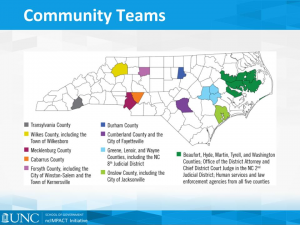
In theory, helping the teams create a 5-minute, multimedia presentation would have been fairly easy before COVID. They likely would have visited Chapel Hill during the summer for meetings, and I could have set them up for audio or video recording with professional equipment at the SOG. Worst case scenario, I may have had to make a road trip to the communities in order to co-create the presentations. However, COVID-19 has made client relationships much more complicated, especially in communities that may lack strong broadband access or public health infrastructure. Many of the individuals and organizations in the ORP are doing double duty as COVID-19 contact tracers, care providers, or policymakers. They are often extremely busy, even overwhelmed, with pandemic-related work, which makes finding time to meet difficult.
Additionally, travel restrictions and bans on in-person meetings have made all of our work on the presentations virtual. Instead of a day’s worth of recording, I have to schedule weeks of time in which I provide drafts to project managers and teams, they record audio, and I put the final products together. This has made working with clients much more difficult than it likely would have been without the influence of coronavirus. However, the teams have also expressed their gratitude for my help during this time, as they are overworked and already coping with drastic changes to in-person programs and services, including drug courts, syringe exchanges, and medical care and counseling. Although the pandemic might have made it more complicated and time-consuming, it has also taught me how to work with diverse clients virtually, and has thereby been a valuable professional experience both now and in the future.
Memorial Day weekend was a welcome break from a busy two weeks at my PWE. One of ncIMPACT’s staff members is ill, changing our team’s work flow. Suddenly, an important work product for the social capital project needed support, and it fell on my shoulders to complete a draft of a literature review in just a couple of days. I also picked up other responsibilities on both the social capital and EITC project which required me to attend an additional series of meetings, pulling my time and attention in multiple directions as we worked to complete the review. I felt not only the pressure of deadlines, but also pressure to step up as a new part of a small team and assert myself as an organizational representative.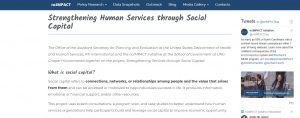
On Thursday of last week, I was talking to a friend who asked me if I was enjoying my internship. I immediately launched into an explanation of all the Zoom meetings I had, the deadlines I was up against, and the stress I was feeling because of it all. I waxed poetic about the additional stress of COVID-19, and how I hadn’t even had the chance to meet my coworkers because of it. After letting me vent, he said, “Okay, but are you enjoying it?” I paused for the first time in several days to actually think about that question. Sure, I was busy and maybe even a little overwhelmed by trying to adapt to my new role in the team so quickly. But did that mean that I wasn’t enjoying my time with ncIMPACT? Did it mean that maybe I was in the wrong place, at the wrong time?
Despite the stress of last week, reflecting on my experience allowed me to realize that this is exactly where I want to be right now, COVID aside. My supervisor and field instructor supported me both personally and professionally, including letting me flex my hours to work longer on some days so I could leave early Friday for a weekend away. Anita, ncIMPACT’s director, trusted me enough to let me attend an outward-facing meeting with clients as the only ncIMPACT representative because of my performance in earlier project meetings. And research partners valued my input during our interactions that they were responsive to a proposal I made to potentially augment a study design to collect key informant data, since COVID was affecting our ability to collect it from community members in a timely fashion.
Having more on my plate can be, rightfully, a source of worry. However, it really means that I am being allowed to dig in to the content and management of projects, meaningfully contribute to work, and grow as a social worker and public administrator. Being a part of a team that is as invested in my development as they are the outcomes of my work has been invigorating and encouraging. I can’t wait to see what else I’ll get to sink my teeth into this summer.
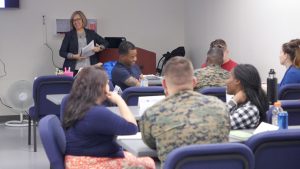 ncIMPACT Initiative is an applied public policy team that works with public officials to develop collaborative solutions to North Carolina’s wicked problems. They use an interdisciplinary approach, data driven high-quality analysis, and innovative practices to implement, evaluate, and publicize these solutions while remaining politically and policy neutral.
ncIMPACT Initiative is an applied public policy team that works with public officials to develop collaborative solutions to North Carolina’s wicked problems. They use an interdisciplinary approach, data driven high-quality analysis, and innovative practices to implement, evaluate, and publicize these solutions while remaining politically and policy neutral.
This is where I’ll be doing my Professional Work Experience. My introduction with ncIMPACT is a Zoom call with my new supervisor, Emily, on Monday at 9 AM. It’s the second to last day of exams and I’m still turning in a final tonight, but my MSW-MPA requirements mean I’m working 600 hours this summer; there’s no time to take a week or two and recuperate. The whirlwind of getting onboarded to a new organization coincides with the relief of finishing off an unusual and difficult semester, thanks to the coronavirus.
COVID-19 has blurred the lines between work and life so thoroughly that transitioning from academia to work is almost effortless, at least logistically. I’m still working from home, likely through at least the end of May, if not longer. Instead of Zoom classes, it’s Zoom meetings as I get acquainted with ncIMPACT’s work and the projects I’ll be working on this summer. Part of the SOG, ncIMPACT runs applied public policy and research projects all over the state, building collaboratives in order to implement solutions to complex community problems. I’m curious to see how ncIMPACT straddles the academia-practitioner divide, aiming for direct implementation of research rather than the traditional route of academic publishing.
I’ll be working on at least four different projects this summer: their UNC-TV series, the Opioid Response Project, their federally-funded social capital project, and the EITC in NC project. Run by two different project managers, Emily and Brooklyn, these interesting projects will keep me busy as I work with a variety of staff and clients. I’m thrilled to have found an organization that will allow me to stretch both my social work and public administration muscles, doing research, policy, assessments, interventions, and evaluations of communities and systems.
In my first week, I’m already writing blogs for UNC-TV, attending virtual town halls, and getting involved with a literature review process for the social capital project, plus a variety of meetings to learn more about how I will be contributing to each of the four projects this summer. I can’t wait to see what I learn and accomplish as I look towards my final year of grad school. Let’s get started!
We’ve all been inundated with news about the coronavirus crisis that the world is coping with these days. Throughout the ordeal, public administrators remain on the front lines of the pandemic serving in many roles at all levels of government. Living through a time of crisis is unsettling, but I am encouraged by the committed public servants I interact with each week both in my PWE and in the MPA program. Students showed up in class this week despite working twelve (or more) hour days responding to the crisis. They work in local budget offices and health departments and emergency management. They serve in state and federal agencies, preparing their communities for the ongoing situation and the recovery that will follow.
Two weeks ago (has it really been only two weeks?) I drove down Main Street in Canton on the way to my PWE and noticed that downtown was thriving. Workers stood on ladders erecting signs for new businesses. Shoppers passed through the doors of boutiques. Tourists sat on the patios of the local restaurants. Since then, measures taken in response to COVID-19 have resulted in rapid and dramatic changes. When I drove through town this morning, the sidewalks were deserted. Except for a small number of residents venturing out for supplies or employees traveling to their shifts, the streets remain noticeably quieter.
Changes brought on by this pandemic have fundamentally altered the way we live, forcing everyone to adapt. In many ways, being a student in the MPA@UNC program has prepared me for working in the current environment. As other managers, employees, and students face a learning curve transitioning to remote work and distant learning, my PWE and school work continue uninterrupted. Like everyone else, I wake up wondering what changes the day’s news will bring. And, of course, the coronavirus has disrupted much of what I do every day. I am forced to balance new responsibilities while remaining focused on finishing my PWE, writing research papers, giving final presentations, and completing final exams. For now, though, I am grateful to be part of a program that has enabled me to adjust to uncertainty and confront new challenges every day.